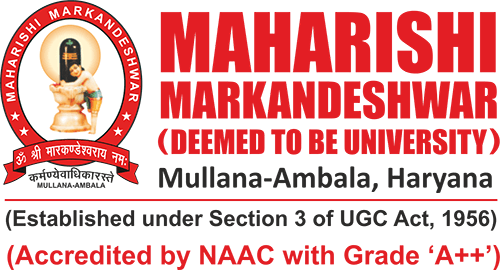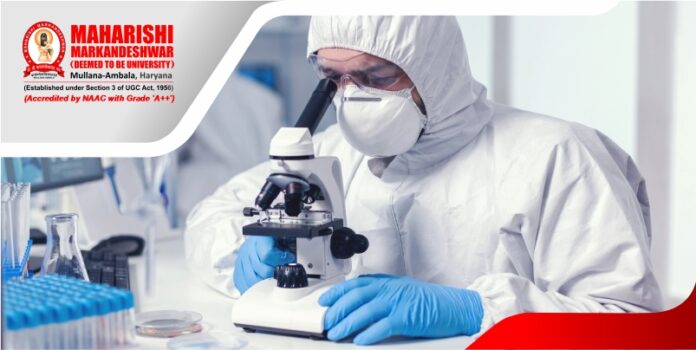Do you wish to be a member of a community which embark on understanding a world of microbes which can produce cheese, vaccines, as well as those which caused history’s biggest lock-down, a world of viruses by pursuing the Master of Science (M.Sc) in Microbiology? Read more about the Master of Science (M.Sc) in Microbiology which is a postgraduate program that delves into the study of beneficial or pathogenic microorganisms, which include bacteria, viruses, fungi, and other microscopic organisms.
M.Sc Microbiology is not just a program; it’s an expedition into a realm where curiosity meets discovery. From the bustling cities of bacteria to the mysterious kingdoms of fungi, each lesson is a chapter in the riveting tale of life at its tiniest scale. So, fasten your lab coat, peer through the microscope, and get ready to explore a world where the small holds the mightiest wonders. Read more if you are keen to picture yourself as a microbial detective, equipped with the tools to decode the language of the microscopic world. Here are key aspects of the M.Sc Microbiology course –
The Curriculum of M.Sc Microbiology:
- Core Subjects:
M.Sc Microbiology programs typically cover core subjects such as bacteriology, virology, mycology, immunology, microbial physiology & genetics, dignosticsand their molecular biology.
- Practical Training: The course includes laboratory work, where students gain hands-on experience in techniques related to microbial cultivation, identification, and experimentation for their utility in medical sciences, agriculture,food technology, environmental science, nanotechnology, biosensor based diagnosticsand microbiome. Enrolling in the M.Sc Microbiology program at MM(DU), Mullana, offers a myriad of advantages for aspiring microbiologists to join the microbial community. The institution is known for providing a high-quality education and research that combines theoretical knowledge with practical training options along with a research based clinch.
- Research Project: Many M.Sc Microbiology programs require students to undertake a research project, fostering independent research skills and contributing to the advancement of scientific knowledge. They would work along with Ph.D students in various Govt and non-Govt funded projects.
What kind of Skills will a student develop with M.Sc Microbiology program?
M.Sc Microbiology is an engaging and challenging program that equips students with the knowledge and skills needed to understand, study, and contribute to the world of microorganisms, making a significant impact in various industries and scientific research.
- Laboratory Techniques: Students gain proficiency in various laboratory techniques used in microbiological research and analysis.
- Analytical and Critical Thinking: The program hones analytical and critical thinking skills, essential for interpreting complex data and drawing meaningful conclusions.
- Problem-Solving: Microbiology involves solving real-world problems related to infectious diseases, antimicrobial resistance, and environmental challenges.
- Communication Skills: Effective communication of research findings, both in writing and verbally, is a crucial aspect of the course.
Career Opportunities after M.Sc Microbiology:
After completing a M.Sc in Microbiology, graduates have a range of career opportunities across various industries. Here’s a detailed overview of potential career paths:
- Research and Development (R&D):
Research Scientist: After finishing the course, you can engage in cutting-edge research to advance understanding in areas like microbiology, immunology, or molecular biology.
Laboratory Manager: Oversee laboratory operations, ensuring efficiency and adherence to safety and quality standards.
- Pharmaceutical and Biotechnology Industries:
Pharmaceutical Microbiologist: You can contribute to drug development, quality control, and production processes in the pharmaceutical sector.
Biotechnologist: Work on the development of biotechnological products, such as vaccines or biotherapeutics.
- Healthcare and Diagnostics:
Clinical Microbiologist: You can work in clinical laboratories diagnosing and studying diseases caused by microorganisms.
Medical/Scientific Writer: Communicate scientific findings through publications, reports, or educational materials.
- Environmental Microbiology:
Environmental Microbiologist: Study the role of microorganisms in ecosystems, contribute to environmental management, and assess environmental impact.
- Food and Beverage Industry:
Food Microbiologist: Ensure the safety and quality of food products by conducting microbial testing and implementing quality control measures.
- Public Health:
Epidemiologist: Study the patterns and causes of diseases in populations, contributing to public health strategies and policies.
Public Health Microbiologist: Focus on preventing the spread of infectious diseases within communities.
- Government and Regulatory Bodies:
Regulatory Affairs Specialist: Ensure compliance with regulations in industries such as pharmaceuticals, biotechnology, or food and beverages.
Environmental Protection Officer: Monitor and regulate activities that may impact the environment from a microbiological perspective.
- Quality Control and Assurance:
Quality Control Microbiologist: Monitor and ensure product quality in industries like pharmaceuticals and food processing.
- Entrepreneurship:
You can start Your Own Laboratory or Consultancy: Individuals with entrepreneurial ambitions can establish their own laboratories or consultancy services.
Other than these options, if you are interested in going for further studies, you can pursue a Ph.D. for advanced research positions, often in academia or research institutions.M.Sc Microbiology opens doors to diverse career paths, allowing graduates to apply their knowledge and skills in areas that align with their interests and expertise within the broad field of microbiology.
French microbiologist and chemist Louis Pasteur said, “In the fields of observation chance favors only the prepared mind.” The preparedness of M.Sc students of Microbiology through a rigorous academic and research ecosystem made Mullana one of the leading universities in Northern India. The university’s commitment to research is reflected in the provision of modern laboratories and state-of-the-art facilities, fostering an environment conducive to ground-breaking research initiatives. Moreover, the program offers valuable industry exposure through collaborations, internships, and industry-focused projects, preparing students for real-world applications of microbiology.
With placement assistance at MM(DU) and opportunities to contribute to research publications and attend conferences, students can expect a well-rounded educational experience that not only equips them with a strong foundation in microbiology but also prepares them for successful careers in the field. You can visit this website for more details on admission process and eligibility criteria: https://admission.mmumullana.org/


